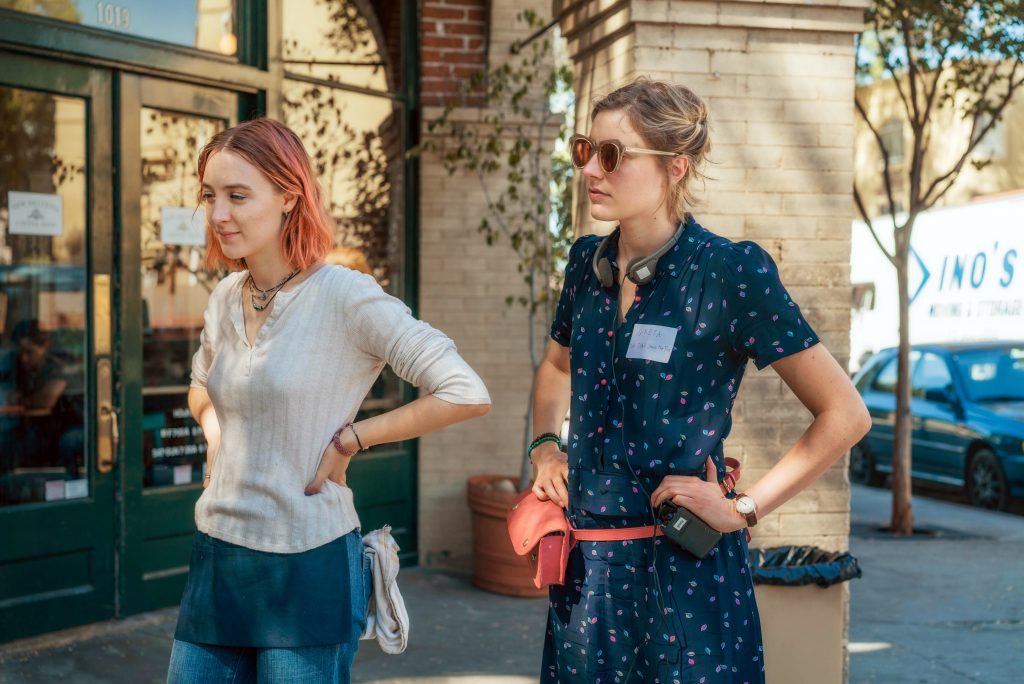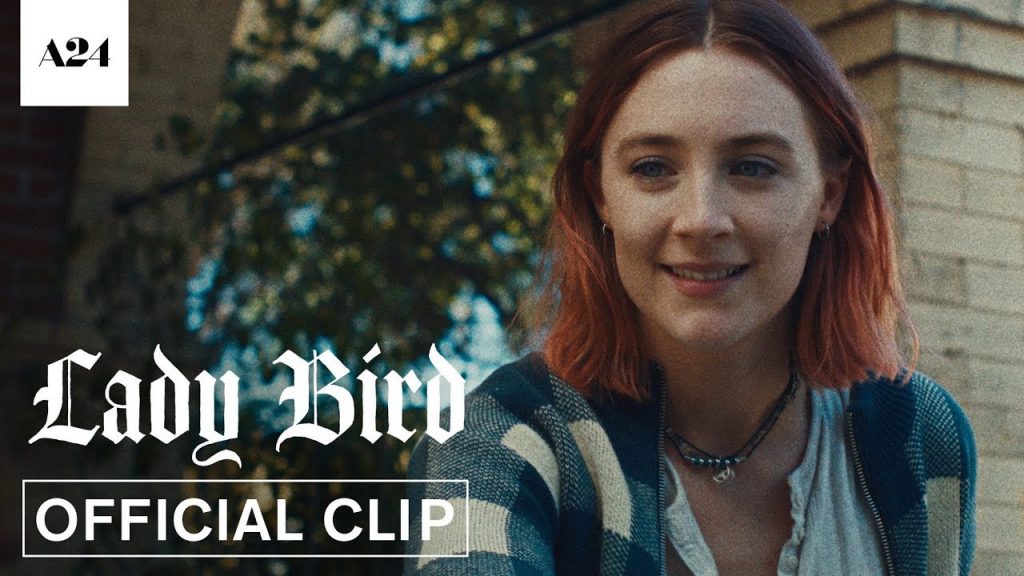Lady Bird movie review: the brightness and confusion of a different kind of youth

At the 75th Golden Globe Awards, “Lady Bird” won two awards in the categories of Best Actress in a Motion Picture – Musical Comedy, and Best Film in a Motion Picture – Musical Comedy. Earlier, the American Film Institute, the National Society of Critics Awards and other authoritative institutions and media included “Miss Bird” in the Top 10 films of 2017.
The English title of the film is “Lady Bird”, I actually prefer the translation of the Taiwanese version of the name “Lady Bird”, the lady implies traditional bondage, and the bird represents the desire to fly, the two form a conflict of beauty, more flavorful than the direct translation.

Director Greta Gerwig has previously acted as an actress and screenwriter in such outstanding films as Frances Ha, The First Lady, and Love in Rome. This time as a film writer and director debut “Lady Bird” can be quite successful, the film added a lot of personal color, with Greta’s strong autobiographical meaning. The film will be set in the director Greta Gerwig’s hometown, California’s capital city of Sacramento, and the film’s heroine’s college experience in New York is Greta’s own schooling experience, and even the heroine’s surname Kristen also cited Greta’s mother’s surname.
The film’s lead actress Lady Bird played by Saoirse Ronan, she had won the Oscar nomination for Best Actress with “Brooklyn”, and this time it was the best actress in a musical comedy film award for her brilliant performance in “Lady Bird”.
It is worth mentioning that the film’s male counterpart, Timothy Zellermeder, is the lead actor in the awards season favorite “Call Me By Your Name”, which will likely compete with “Lady Bird” in this year’s Oscars. Those familiar with “Manchester by the Sea” can also find Lucas Hedges in the film.
As Lady Bird’s opening line, taken from fellow famous female author Joan Didion’s complaint about Sacramento, “Those who discuss California hedonism must never have enjoyed Christmas in Sacramento.”

The story takes place in Sacramento, a small, uncrowded, boring town. The film tells the story of Christine, a girl living in the northern California city of Sacramento, as she navigates family, friendship and love during her senior year, naming herself Miss Byrd and determined to leave California for the East. However, her family’s lack of means is compounded when her father loses his job. She inherits her mother’s strong personality and clashes with her mother in all aspects of her life, but deep down they are closely connected. Eventually, Miss Byrd leaves home to study in New York City, and grows inside as she escapes.
Because Greta had co-written the screenplay with Noah Baumbach, “Frances. Ha” with Noah Baumbach, this “Miss Bird” written by Greta is similar in temperament to “Frances Ha”. Ha” is very similar in temperament to “Frances Ha”, continuing its urban, fresh, literary atmosphere, seemingly, more like a prequel to “Frances Ha”. It seems more like a prequel to “Frances Ha”, telling the story of Frances before she arrived in New York.

The whole work seems to be a running account of life, but I really like this kind of seemingly aimless life trivialities. The script has no main events as the purpose or plot driving, but each emotional conflict point is set up precisely and logically, and all the seemingly bland gossip and indignant night quarrels make the film full of the real texture of life. The film focuses more on the psychological state and emotional development of the characters in the process of growing up in their youth, and the viewer only needs to follow the heroine, Miss Bird, through her youth with care, as if embarking on a journey of memory. Pang Ho-cheung said that he really liked “Frances. Ha” the film, after watching the “Chi Ming and Chun Jiao” series, you can easily understand how much he loves this narrative style.
The film revolves around Miss Bird’s youth, portraying the young girl’s uneasiness with the constraints of tradition and her desire for freedom. Growing up is a constant theme, and the rebellious young Miss Bird easily resonates with a generation of people as she confronts her family, school and society about her sense of self, showing the gradual formation, transformation and growth of young people’s ideas about family, friendship and love. She is not as bad as a punk, but not as good as an honor student. She stubbornly argues with her mother repeatedly, but also desires her mother’s approval and love; she has a shadowy faith in friendship, but also fears the self-exposure brought by excessive closeness; she wants to surrender herself to her lover and taste God’s red apple for the first time, but also resists the impurities brought by deception to pure love.

Thus, Miss Bird is outwardly aggressive towards the world. She is dissatisfied with the conservative dogmatism of the parochial school, bashing and spoofing the nuns to their faces; she is afraid of being looked down upon by her friends so she lies about her home address; she does not want to be trapped in this boring town with less than one-seventh of the population of California for life and wants to escape, but is scolded by her mother that the family economy is not enough to afford her dreams; she smokes a clove cigarette and says fuck but remains patient She hugs her ex-boyfriend Danny who cheats on her, always cares about her unemployed father and helpless mother, is hopeful about her messy life and remains kind at heart.
Newsday says this is the best youth film in recent years. The film’s brilliance lies in the seeming chaos, but almost all the confusion of youth and expectations of the world, the director’s grasp of young life is incredibly accurate, appropriate, comfortable, not to exaggerate a single point. Growing up is an exodus.
“I want you to be the best version of yourself you can be.”
“what if this is the best version?”
The director first depressed and then raised in the confusion of youth life at the end, sprinkling a ray of sunshine, Miss Bird finally went to New York, to achieve the desired, the mother finally relieved to run back to the boarding gate wanted to give his daughter a final farewell, the father quietly handed his daughter some letters written on the mother’s crumpled words of care, Miss Bird with a flowered certificate to the New York church choir, looking at the once loathed church, suddenly felt a long-lost inner So, the moment she picked up her cell phone and left a message for her mother, Miss Bird suddenly grew up.
It turns out that only when you leave do you know how to cherish, and only when you arrive in New York do you understand the warmth of home, and only when you leave the church school do you begin to appreciate the serenity of the church, and growing up is a constant process of giving up and then understanding. The good thing is, no matter how much youthful depression, confusion, love betrayal and family quarrels, as well as her father’s unemployment, when she strides through the streets of New York, sunshine, the shadows of the trees sway, Miss Byrd’s mouth a shallow smile. See, there’s hope for life, isn’t there? Thanks to director Greta Gerwig, it’s like going back to your youth and having a beautiful dream.
